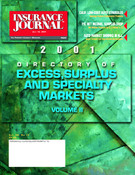Trying to operate in a shaky market, a pair of California workers’ compensation carriers have seen their ratings drop from “A” to “A-” following review by analysts at A.M. Best.
Both Encino-based Republic Indemnity Insurance Pool and Woodland Hills-based Zenith National Insurance Group were lowered based on their relative focus in the California workers’ comp market and the predictions that earnings will stay under Best’s “A” rating level standards in the immediate future, even in light of recent broad based rate firming.
For Republic Indemnity, the lowering of its financial strength rating (FSR) was driven by the deterioration in underwriting performance in recent years, along with A.M. Best’s expectation that management faces a significant challenge to restore earnings to levels that meet Best’s “A” rating level standards, given the current market situation.
According to Lucio Lefante, A.M. Best managing senior financial analyst, the move was in part reflective of the overall workers’ comp market in the state.
“The action was to respond to the deterioration in earnings to levels which were just not consistent with [Republic Indemnity’s] then-current rating level, which was ‘A’ for a long time,” Lefante said. “For a long time and continuing, we still have confidence in Republic Indemnity in terms of being one of the better stand-alone California comp carriers. The market overall is poor, and there has been significant strengthening of rates, but even including those rates increases, our belief is that earnings are going to be below the then-current rating level of ‘A.'”
According to Lefante, the next rating period will probably be next year.
“Overall, the outlook for the market is not strong,” Lefante noted. “Republic Indemnity is in a bad market. The degree of confidence in Republic Indemnity is higher than it is with a lot of other stand-alone California comp writers. It still enjoys a reasonable high rating. The rating (‘A-‘) is not a vulnerable rating, and it is still in several levels within a secure category.”
The lowered FSR for Zenith reflects similar market conditions and financial concerns. According to A.M. Best, mostly due to adverse loss reserve development for accident year 1999 catastrophe insurance losses, Zenith’s underwriting performance was not sufficient to make an operating profit in 2000. In 1999, the group produced an operating loss as a result of added costs brought on by the RISCORP acquisition, which included a charge of $46 million in the third quarter of the year.
To offset the negatives, Zenith’s disciplined operating strategy has produced a consistent accident year loss ratio advantage for the group. Rates have continued to increase in California, where Zenith writes some 45 percent of its business, and positive premium growth has also aided in improving the group’s expense ratio. The group benefits from the financial strength and flexibility of its parent, Zenith National Insurance Corp., with $1,472 million in total assets and $310 million in shareholders equity.
“Given Zenith’s conservative operating philosophy and solid market position, the group is better positioned than most other carriers to benefit from the improving conditions of the California workers’ compensation market,” Best stated.
Was this article valuable?
Here are more articles you may enjoy.


 Premium Slowdown, Inflation Factors to Lead to Higher P/C Combined Ratio: AM Best
Premium Slowdown, Inflation Factors to Lead to Higher P/C Combined Ratio: AM Best  Meta Loses Insurance for Defense in Major Social Media Addiction Litigation
Meta Loses Insurance for Defense in Major Social Media Addiction Litigation  Marsh Awarded Injunction Against Former Employees Now With Howden US
Marsh Awarded Injunction Against Former Employees Now With Howden US  Zurich Insurance Said to Near Beazley Deal Funded by Equity Sale
Zurich Insurance Said to Near Beazley Deal Funded by Equity Sale 


